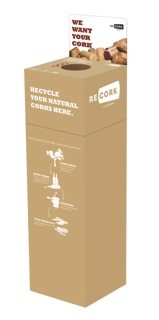 There are plenty campaigns and initiatives advocating sustainability in the vineyard. What about at the other end of the wine chain? We recycle glass bottles, but what about cork? Wine closures make up 70% of the entire cork market, so a focus by wine drinkers on recycling and replanting cork trees could have a significant impact on responsible waste management and world wide cork forest sustainability.
There are plenty campaigns and initiatives advocating sustainability in the vineyard. What about at the other end of the wine chain? We recycle glass bottles, but what about cork? Wine closures make up 70% of the entire cork market, so a focus by wine drinkers on recycling and replanting cork trees could have a significant impact on responsible waste management and world wide cork forest sustainability.
Portugal and Spain make up over 50% of the 2.2 million world wide hectares of cork, with the remaining hectarage spread around the Mediterranean. A proliferation of synthetic and screw top wine bottle closures is impacting long term sustainability of these forests. Luckily, cork forest farming is an inherently stable practice since it only involves bark stripping every nine or ten years. In addition, good recent management has cork forest hectarage on the rise.
Cork forests contribute to climate control in the face of global warming trends, are home to a set of endangered animal species like lynx and eagles, are only second to the Amazon in terms of biodiversity, and provide economic value to the rural populations in close proximity to these forests. Cork trees need to hit 25 years of age before they are ready to harvest, and the first couple of harvests generally result in poor quality material. So trees can be fifty years old before their first meaningful harvest and can provide an additional 15-20 harvests until the end of their useful lifetime. Planting and expanding cork forests is a good thing for the long term.
The ongoing argument whether or not cork is more or less reliable than synthetic or screw cap closures in protecting bottled wine is a separate issue. Personally, I prefer cork over all other closures and am willing to gamble on the occasional taint or spoilage associated with the recyclable, biodegradable, organic stopper. Buying cork supports farmers while supporting synthetic closures benefits the petroleum industry. Do we need a better reason to get behind cork recycling and growing? The rumbles of criticism aimed at cork marketers’ campaigns should not divert consumers’ attention away from the positive environmental impact of recycling and replanting.
 During the month of September the California Wine Club is running a cork drive to collect and recycle 20 million corks and plant 1,000 trees. The campaign is run in association with the ReCORK program that already collected and recycled almost 18 million corks and planted 6,800 trees. ReCORK is supported by the largest producer of natural wine closures in Portugal, so there is no hiding the fact that this campaign aims to promote the values of cork in wine, and other consumer products like shoes, along with its environmentally sustainable attributes. Here is how it works and how you can participate:
During the month of September the California Wine Club is running a cork drive to collect and recycle 20 million corks and plant 1,000 trees. The campaign is run in association with the ReCORK program that already collected and recycled almost 18 million corks and planted 6,800 trees. ReCORK is supported by the largest producer of natural wine closures in Portugal, so there is no hiding the fact that this campaign aims to promote the values of cork in wine, and other consumer products like shoes, along with its environmentally sustainable attributes. Here is how it works and how you can participate:
1) Contact the California Wine Club at 1-800-777-4443, by e-mail at info@cawineclub.com, or via Facebook (https://www.facebook.com/
profile.php?id=1471585235#!/ ), and they will provide a postage paid envelope for you to return your corkspages/CWC-Cork-Drive/ 122918901125308 2) For every cork received from you, you will be entered in to a weekly contest for a variety of items, including wine magnums, California Wine Club memberships or shoes (from Sole)
3) For every 30 corks you send, you will earn a $10 credit towards a next purchase from the California Wine Club. You can use the credits as they are earned, or save them to use later.
4) For corks received by the California Wine Club, SOLE will donate a pair of shoes to Soles 4 Soles.
While there are commercial interests behind this drive, I am happy not to pass any judgment in that regard. I like cork. I use cork for floor and wall coverings. I want to hear a pop with every bottle of wine I open. I made a trivet from corks about fifteen years ago. Since I only need one of those, I think I will be sending my corks to the California Wine Club this month and invite you to do the same.